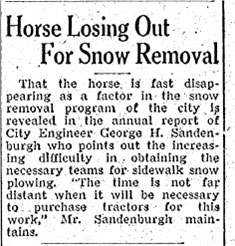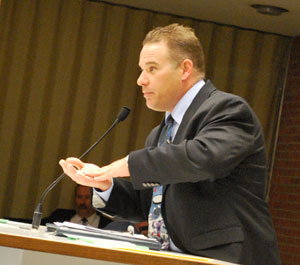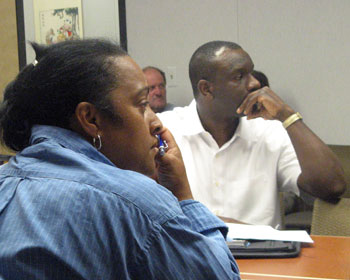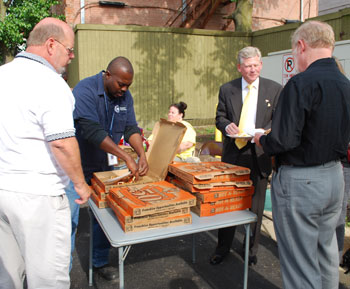Ann Arbor: Engaging the FY 2012 Budget
Editor’s note: On Jan. 31, the city council will begin a series of workshops on next year’s budget. The most recent status update from the city’s CFO, Tom Crawford, is that the city faces a $2.4 million shortfall if it does not reduce expenses. That figure assumes: (1) The city will receive around $2 million in parking revenue from the Ann Arbor Downtown Development Authority; (2) shared sales tax revenue from the state will continue at the same levels as last year; and (3) unresolved labor contracts will settle in a way that results in no increases to the wage structure, plus additional reductions equivalent to the cost savings the city would see if all employees were on the new health care plan.
The council has already convened two retreats on the budget – this report is a summary of those retreats.

From the May 19, 1936 edition of the Ann Arbor Daily News. The scan was passed along to The Chronicle by the city's environmental coordinator, Matt Naud. Naud's source was Craig Hupy, head of the city's systems planning unit, who discovered some old papers in an antique store.
Late last year, on Dec. 4, 2010, the Ann Arbor city council held the first of two budget retreats for the next year’s budget adoption process. The current 2011 fiscal year ends on June 30, 2011, and the council will need to finalize its FY 2012 budget in May. The council typically begins contemplating the next fiscal year’s budget at a retreat near the end of the calendar year.
Two days after the first retreat, at the Dec. 6 regular city council meeting, city administrator Roger Fraser and councilmembers recapped the event, with Stephen Rapundalo (Ward 2) describing it as the best retreat discussion on the budget since he’s been on the council. First elected to the council in 2005, Rapundalo has five previous budget seasons to compare against.
The December retreat agenda reflected two main items: (1) general economic conditions; and (2) a sustainable service delivery model. The grim condition of the state’s economy was a point that was also driven home by Kirk Profit – director of Governmental Consultant Services, the city’s lobbyist in Lansing – in a presentation to the council at their Dec. 6 regular meeting.
The second retreat, on Jan. 8, followed up with a focus on services. To prepare for the retreat, councilmembers had ranked various city services by priority.
At both retreats, councilmembers and staff took the opportunity to communicate a message to city labor unions, some of whom Rapundalo characterized as not yet having seen fit to “recognize economic reality.”
And as chair of the council’s labor committee, Rapundalo has said he’ll give updates at the council’s regular meetings on the status of labor negotiations. He started the updates at the council’s Jan. 20 meeting. The implicit message communicated by the first update: Ann Arbor’s labor unions aren’t making the kind of concessions they should reasonably make, given economic conditions.
This report features highlights of the discussion from both retreats – including issues like the city’s approach to fire and police protection, solid waste and composting, as well as possible replacement of the general fund operating millage with a city income tax.
At both retreats, city administrator Roger Fraser and key city staff did their best to frame the council’s conversation not as a question of what services to cut. Instead, they tried to get councilmembers to consider which services might be delivered in a different way. The sustainability of the service delivery model depends on how the city delivers those services to residents – ranging from employment of full-time city workers, outsourcing the work, or by not offering the service at all.
To frame the context of these comparatively brief retreat highlights, we first offer a look back to 1936, when the city delivered a sidewalk snowplowing service to its residents. How? Partly by hiring in teams of horses to do the job. [Full Story]






